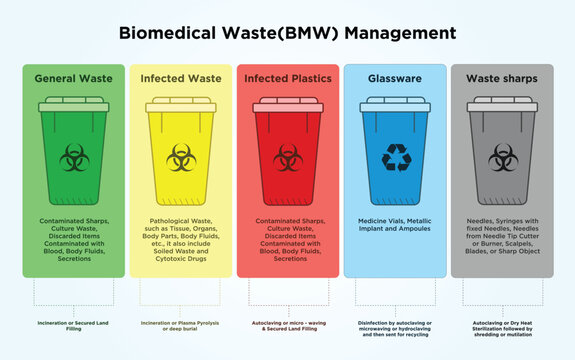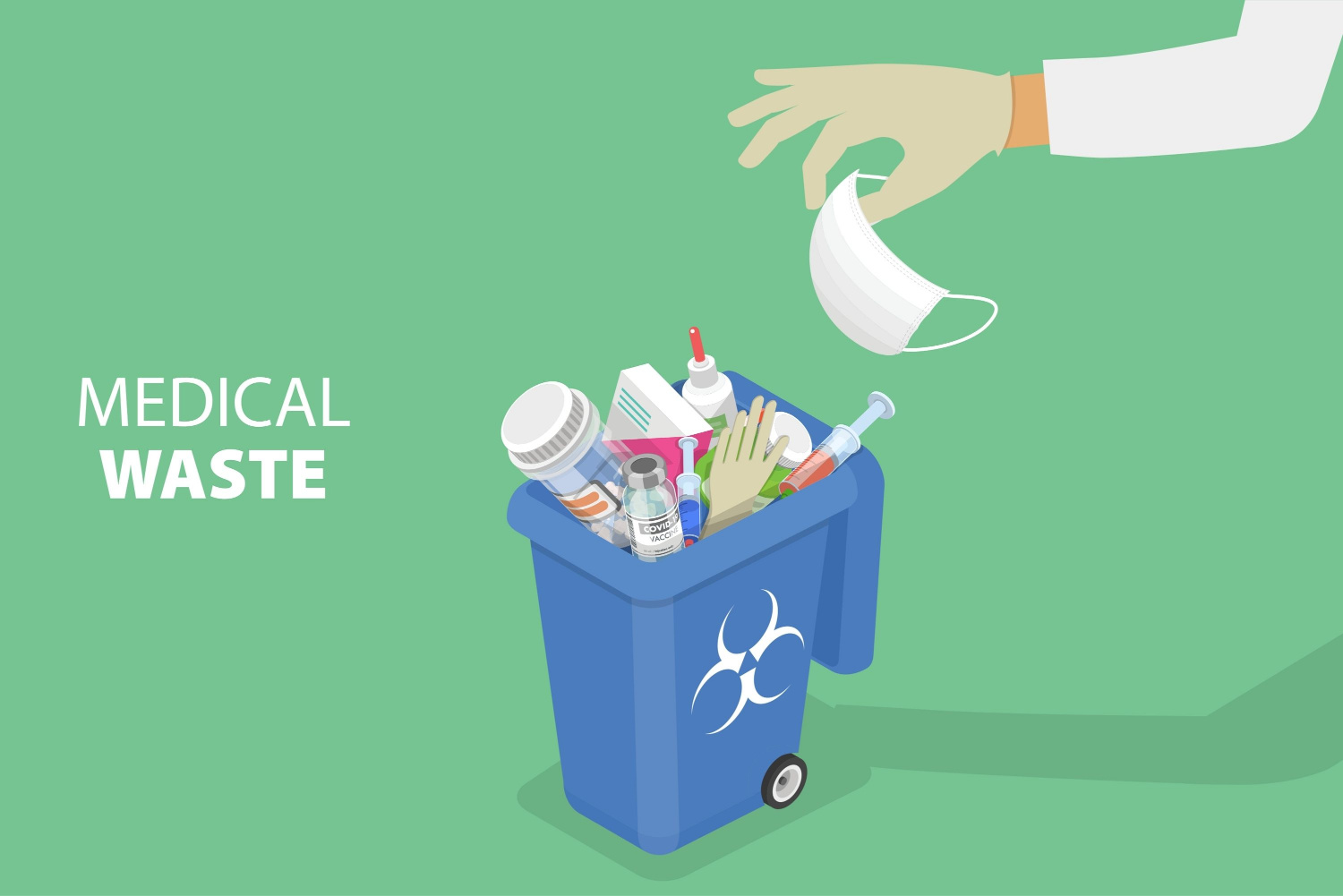Finest Practices for Medical Waste Administration
Medical waste monitoring is a vital aspect of healthcare facilities' procedures to make certain the security of patients, staff, and the atmosphere. Carrying out ideal practices in medical waste management is crucial to lessen the threats connected with harmful waste.
Segregation and Categorization
In the field of clinical waste monitoring, correct partition and classification are important techniques for guaranteeing the safe and efficient disposal of healthcare-related products. Medical waste is generated from various sources, consisting of medical facilities, centers, research laboratories, and various other health care facilities. It includes a variety of things, such as needles, syringes, bandages, handwear covers, and pharmaceutical waste.
Partition includes the methodical splitting up of different kinds of medical waste based on their features and potential threats. Sharps waste, such as blades and needles, need to be positioned in puncture-resistant containers to stop injuries and the spread of infectious diseases.
Classification is the process of categorizing medical waste right into various categories based upon its prospective dangers. WasteX Medical Waste Disposal. These categories might include transmittable waste, contaminated materials, pharmaceutical waste, and general waste. By categorizing waste, medical care facilities can identify the appropriate disposal approaches and make sure compliance with neighborhood guidelines and guidelines
Correct segregation and classification of clinical waste not only shield the health and wellness of medical care workers and the public however also add to the general efficiency and performance of waste management. It lowers the danger of accidents, lessens environmental influences, and promotes liable waste disposal techniques.
Appropriate Storage Space and Identifying
To ensure the risk-free and efficient disposal of clinical waste, healthcare centers should stick to appropriate storage space and labeling practices. Correct storage and labeling play an essential duty in maintaining the honesty of clinical waste administration systems and shielding the health and wellness and safety and security of healthcare workers, people, and the public.
When it pertains to storage space, it is vital to have actually designated areas especially made for different kinds of clinical waste. These locations should be protected, well-ventilated, and outfitted with appropriate containers that satisfy regulative standards. Segregation and categorization of waste must additionally be considered to stay clear of cross-contamination and possible hazards.
Additionally, correct labeling is important for effective waste monitoring - medical waste removal service. Each container ought to be clearly identified with the proper icons, color-coding, and details about the waste it consists of.
Normal surveillance and inspection of storage space locations and containers are necessary to recognize any kind of concerns or offenses. Personnel ought to be trained on proper storage space and labeling methods, emphasizing the significance of compliance with protocols and laws.
Safe Transport and Handling
Making sure the proper and secure transport and handling of clinical waste is critical for maintaining the integrity of waste administration systems and protecting the health and safety and security of all entailed. Medical waste, that includes items contaminated with transmittable products, pharmaceuticals, and various other unsafe compounds, should be delivered in a way that avoids leaks, spills, and possible contamination.
It is crucial to make use of puncture-resistant and leak-proof containers that are particularly made for clinical waste. Additionally, waste ought to be set apart based on its nature and kind to prevent cross-contamination.
During transportation, it is very important to ensure that waste containers are securely fastened and stored in a stable way. Cars utilized for moving clinical waste needs to be equipped with appropriate safety functions, such as spill containment systems, to reduce the danger of any type of leaks or spills (medical waste removal). Drivers should receive training on proper handling and emergency situation feedback treatments to properly resolve any kind of unpredicted cases
In addition, the transport and handling of medical waste should abide by all pertinent laws and standards stated by local, state, and federal authorities. Normal examinations and audits should be performed to examine compliance and identify any kind of locations for enhancement.

Conformity With Regulatory Guidelines
Preserving compliance with governing standards is vital for efficient medical waste monitoring. These guidelines are implemented to secure public health and the atmosphere by ensuring that clinical waste is correctly handled, dealt with, and disposed of. medical waste disposal service. Compliance with governing guidelines assists to stop the spread of transmittable illness, decrease prospective hazards, and minimize the overall effect of clinical waste on the atmosphere
To attain compliance, medical care facilities need to stay notified concerning the certain laws regulating clinical waste management in their territory. These regulations may differ from country to country, and also within different states or areas. It is essential for health care centers to have a comprehensive understanding of these standards and to apply suitable approaches and protocols to make sure conformity.
One trick aspect of compliance is the correct segregation and labeling of different sorts of clinical waste. This consists of separating sharps from various other waste, as well as categorizing waste based on its possible dangers. Medical care facilities should additionally ensure that clinical waste is saved in appropriate containers which these containers are effectively labeled and sealed.
In addition, compliance with regulative standards requires healthcare centers to establish appropriate training and education and learning programs for employee entailed in clinical waste administration - WasteX Medical Waste Disposal. This includes providing training on waste segregation, handling, and disposal treatments, along with the appropriate use personal protective tools
Normal surveillance and audits are likewise vital to make sure continuous compliance with governing standards. This includes conducting regular inspections of waste storage space locations, documenting waste monitoring treatments, and maintaining records of garbage disposal.
Efficient Disposal Methods
Healthcare centers should employ reliable disposal techniques for proper monitoring of medical waste - WasteX Medical Waste Disposal. Incorrect disposal of clinical waste can present major health and ecological risks. There are a number of methods that can be utilized to effectively take care of medical waste, making certain the security of medical care workers, people, and the general public
One generally used approach is incineration. Incinerators can safely melt medical waste at high temperatures, reducing the volume and damaging any possibly harmful microorganisms. Incineration can be costly and may launch unsafe pollutants into the air if not appropriately managed.
Another technique is autoclaving, which entails subjecting the waste to high-pressure heavy steam. This procedure eliminates germs, infections, and other bacteria, making the waste secure for disposal in regular waste streams. Autoclaving is a i loved this reliable and eco-friendly technique, however it calls for specialized devices and experienced personnel.
Chemical disinfection is likewise made use of in some cases, where liquid chemicals are used to the waste to disinfect it. This method is much less generally used because of concerns about the efficiency of chemical sanitation and the potential for chemical residues to contaminate the atmosphere.
In enhancement to these approaches, healthcare facilities ought to likewise carry out correct partition, packaging, and labeling of medical waste to ensure its risk-free handling and disposal. Normal training and education and learning of team on proper waste management methods are critical to keeping effective disposal methods.
Final Thought

Clinical waste administration is an essential aspect of healthcare centers' procedures to make certain the security of patients, team, and the environment. Applying finest practices in medical waste monitoring is necessary to reduce the threats connected with unsafe waste. These classifications might include transmittable waste, hazardous waste, pharmaceutical waste, and basic waste.In conclusion, carrying out best methods for clinical waste management is essential for ensuring the security of healthcare employees, clients, and the environment. By effectively segregating and classifying waste, saving and identifying it appropriately, making sure safe transport and handling, complying with regulative guidelines, and using efficient disposal techniques, healthcare facilities can successfully manage and reduce the threats associated with clinical waste.